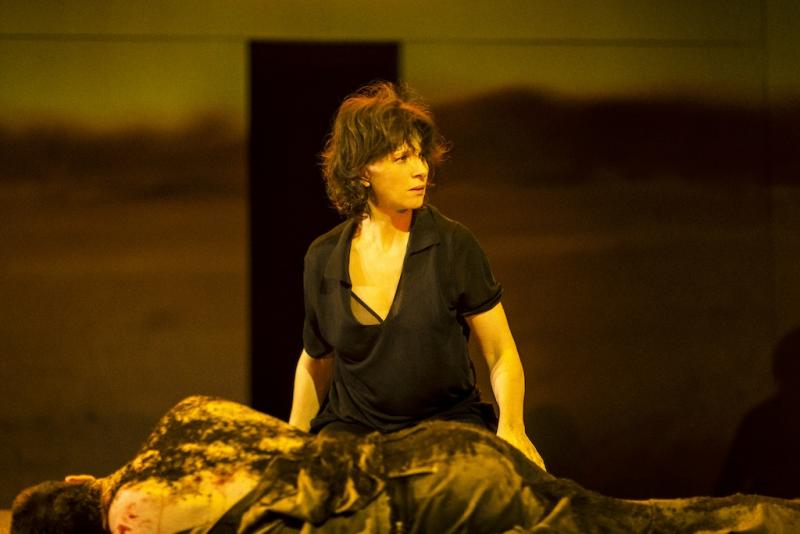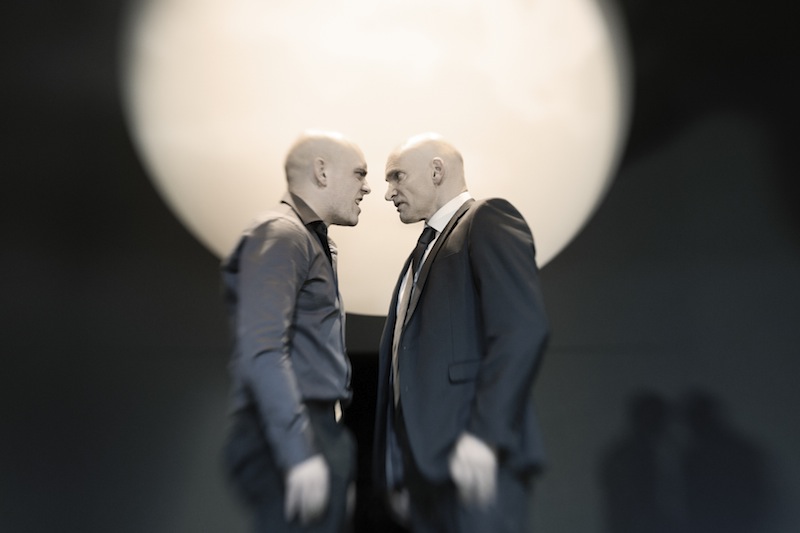Antigone, Barbican | reviews, news & interviews
Antigone, Barbican
Antigone, Barbican
Juliette Binoche fails to shine as Sophocles’ heroine, in an otherwise fine production

Last year the London stage was treated to an electrifying Medea and an intelligent, refreshing Electra, at The National and the Old Vic respectively. Now it’s the turn of the Barbican to unleash the formidable force of Greek tragedy upon us, switching from Euripedes to Sophocles and a heroine who, compared to those others, is a pure-hearted innocent.
And how does the production compare? Favourably. In fact, Belgian director Ivo van Hove has offered a modern-dress interpretation as thrilling as his take on Miller’s A View From The Bridge, currently playing across town. It’s elegantly staged, with a marvellous new translation by Anne Carson that crackles with canny colloquialism and insight, features one of the best, most robust Greek choruses I’ve encountered and makes the play feel almost shockingly relevant.
One reason this is such a wonderful play is that it eschews the bloodletting of other tragedies, but feeds off the memory That it does not wholly deliver is due, surprisingly, to its star. Juliette Binoche captures the essence of Antigone simply by her bearing – that mixture of moral certitude, crazed rebelliousness and vulnerability. But the delivery is erratic; she’s not yet in her groove.
The first view of her could not be more effective, striding across the Barbican’s wide stage, dressed in black, wind blowing through her mane-like hair, a scarf flying behind her, profile proud. As Antigone embraces her sister, Ismene (Kirsty Bushell), she’s a woman on a mission.
Having waged civil war over control of Thebes, the sisters’ two brothers are both dead. Their uncle Kreon (Patrick O’Kane, pictured below right, with Samuel Edward-Cook) has taken the throne, determined to fashion a state beyond personal considerations. He buries one nephew, but decrees that the antagonist of the war, Polyneikes, must rot in the sun. Antigone vows to bury him, thus defying the king.
 The play is a battle between the two; between Kreon’s assertion that “if a man puts family or friends ahead of fatherland, I count him absolutely good for nothing,” and Antigone’s devotion both to family and to the fundamental right of burial. Once she is caught in her “act of perfect piety” his decision to bury her too, alive, unhinges everything he’d hoped to secure.
The play is a battle between the two; between Kreon’s assertion that “if a man puts family or friends ahead of fatherland, I count him absolutely good for nothing,” and Antigone’s devotion both to family and to the fundamental right of burial. Once she is caught in her “act of perfect piety” his decision to bury her too, alive, unhinges everything he’d hoped to secure.
Just as Electra feels she has no choice but to grieve in perpetuity for her dead father, so Antigone must bury her brother, whatever the cost; there’s an honour to her insistence that’s irrefutable. The tragedy is really that of Kreon, whose misguided intransigence causes everyone’s undoing.
One reason this is such a wonderful play is that it eschews the bloodletting of other tragedies, but feeds off the memory; Oedipus’s shadow looms over events, Antigone is said to be paying her father’s debts, while Kreon recognises that he is locked still in a familial cycle of self-destruction.
In the meantime, the action is verbal, as Kreon’s stiffly suited bureaucrat is embroiled in debate over his actions. This is where van Hove’s use of the chorus comes into its own, his supporting cast working collectively as Kreon’s advisors, swaying between the arguments, while each peels off to play an individual prepared to stand up to him, demonstrating the flexibility – and the political nouse – that he cannot.
The confrontations between Kreon and his son Haimon (Samuel Edward-Cook), then with the seer Tiresias (Finbar Lynch) are particularly scintillating, not least when father and son clash bald-headedly over the fate of one’s niece, the other’s fiancée.
Another of the chorus, Obi Abili, also doubles as comic relief – and the closest the play comes to an ordinary Theban citizen – as a guard with an instinct for self-preservation that the royal family could well use.
 Jan Verswetwel’s set reflects the central tension in the play between the state and the eternal. At the fore is a strip of black leather sofas and low wooden cabinets, creating the feel of a swanky but informal meeting room, the setting for quietly-spoken, faux civilised political machination. Behind them, a back projection – sometimes of urban street scenes, more potently of desert landscapes – is dominated by a glorious, moving sphere, doubling as the sun and moon. Between, the bare ground on which bodies lay, alive and dead, waiting for burial.
Jan Verswetwel’s set reflects the central tension in the play between the state and the eternal. At the fore is a strip of black leather sofas and low wooden cabinets, creating the feel of a swanky but informal meeting room, the setting for quietly-spoken, faux civilised political machination. Behind them, a back projection – sometimes of urban street scenes, more potently of desert landscapes – is dominated by a glorious, moving sphere, doubling as the sun and moon. Between, the bare ground on which bodies lay, alive and dead, waiting for burial.
It’s a highly charged setting, around which Anne Carson’s clean, agile, sometimes cheerfully contemporary dialogue dances. One has to chuckle at the cheekiness when Kreon praises his “top notch advisors.” When he is chastised for “the sacrilege that you called public policy” Carson suddenly makes Theban politics hugely resonant. How many current events might be similarly described?
Carson also brings the sexism of the context to the fore, reminding us that women were given little part to play in this society. “We two are alone,” Ismene tells her sister, “moreover we’re girls.”
In her defiance, Antigone does her level best to address this imbalance. And Binoche, with her innate, ferocious individualism, ought to be perfect in conveying that. In her quieter, more ironic moments, she is, while also making palpable the description of her rebel as “alien, foreign and strange”. At others, however, she is too manic, too shouty, mincing her words, belying the clarity of the text. And then you feel the audience leaving her.
rating
Explore topics
Share this article
The future of Arts Journalism
You can stop theartsdesk.com closing!
We urgently need financing to survive. Our fundraising drive has thus far raised £33,000 but we need to reach £100,000 or we will be forced to close. Please contribute here: https://gofund.me/c3f6033d
And if you can forward this information to anyone who might assist, we’d be grateful.

Subscribe to theartsdesk.com
Thank you for continuing to read our work on theartsdesk.com. For unlimited access to every article in its entirety, including our archive of more than 15,000 pieces, we're asking for £5 per month or £40 per year. We feel it's a very good deal, and hope you do too.
To take a subscription now simply click here.
And if you're looking for that extra gift for a friend or family member, why not treat them to a theartsdesk.com gift subscription?
more Theatre
 Alfred Hitchcock Presents: The Musical, Theatre Royal Bath review - not a screaming success
1950s America feels a lot like 2020s America in this portmanteau show
Alfred Hitchcock Presents: The Musical, Theatre Royal Bath review - not a screaming success
1950s America feels a lot like 2020s America in this portmanteau show
 Wilko: Love and Death and Rock'n'Roll, Southwark Playhouse review - charismatic reincarnation of a rock legend
Johnson Willis captures the anarchic energy and wit of the late guitarist
Wilko: Love and Death and Rock'n'Roll, Southwark Playhouse review - charismatic reincarnation of a rock legend
Johnson Willis captures the anarchic energy and wit of the late guitarist
 Dear England, National Theatre review - extra time for stirring soccer classic
James Graham adds a neat coda to his ode to decency in sport
Dear England, National Theatre review - extra time for stirring soccer classic
James Graham adds a neat coda to his ode to decency in sport
 Weather Girl, Soho Theatre review - the apocalypse as surreal black comedy
A Californian weather girl copes with fires inside and outside her head
Weather Girl, Soho Theatre review - the apocalypse as surreal black comedy
A Californian weather girl copes with fires inside and outside her head
 Clueless: The Musical, Trafalgar Studios review - a perfectly manicured update
KT Tunstall's new score brings bite and momentum to a high octane evening
Clueless: The Musical, Trafalgar Studios review - a perfectly manicured update
KT Tunstall's new score brings bite and momentum to a high octane evening
 The Habits, Hampstead Theatre review - who knows what adventures await?
New play about the game of Dungeons & Dragons explores fact and fantasy
The Habits, Hampstead Theatre review - who knows what adventures await?
New play about the game of Dungeons & Dragons explores fact and fantasy
 Farewell Mister Haffmann, Park Theatre review - French hit of confusing genre, with a real historical villain
Jean-Philippe Daguerre tries to mix a farcical comedy of manners with the Holocaust
Farewell Mister Haffmann, Park Theatre review - French hit of confusing genre, with a real historical villain
Jean-Philippe Daguerre tries to mix a farcical comedy of manners with the Holocaust
 Edward II, RSC, Swan Theatre, Stratford review - monarchs, murder and mayhem from Marlowe
Putsch in the palace brings down a king who chose the wrong person to love
Edward II, RSC, Swan Theatre, Stratford review - monarchs, murder and mayhem from Marlowe
Putsch in the palace brings down a king who chose the wrong person to love
 One Day When We Were Young, Park Theatre review - mini-marvel with a poignant punch
Perfectly judged performances enhance a subtle staging of Nick Payne's two-hander
One Day When We Were Young, Park Theatre review - mini-marvel with a poignant punch
Perfectly judged performances enhance a subtle staging of Nick Payne's two-hander
 Alterations, National Theatre review - high emotional costs of ambition
The Guyanese migrant experience of 1970s London gets the big-stage treatment
Alterations, National Theatre review - high emotional costs of ambition
The Guyanese migrant experience of 1970s London gets the big-stage treatment
 A Knock on the Roof, Royal Court review - poignant account of living under terror
Gaza play is both surreally humorous and finally devastating
A Knock on the Roof, Royal Court review - poignant account of living under terror
Gaza play is both surreally humorous and finally devastating

Add comment